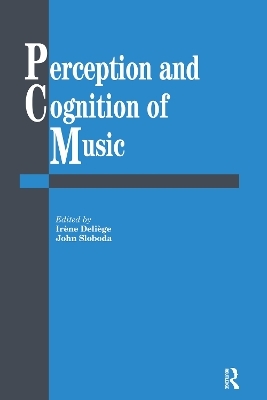
Perception And Cognition Of Music
Psychology Press Ltd (Verlag)
978-0-86377-452-2 (ISBN)
This text comprises of reviews of work relating to music and mind. It presents a range of approaches from the psychological through the computational, to the musicological. The reviews were selected from papers submitted at the Third International Conference on Music Perception and Cognition Liege 1994 to illustrate the wide range of perspectives now being adopted in studying how humans make and respond to music. The book is divided ino five sections. The first part illustrates the role of analysis and ethnomusicology in understanding cultural determinants of musical behaviour. The second part charts what is known about aquisition of musical competence, from pre-birth through to the expert performer. The evidence accumulated about specific areas of the brain which control musical thinking and behaviour is examined in Part Three. The fourth part examines how neurological, behavioural and artificial intelligence approaches are converging to shed light on processes in auditory perception. Finally, Part Five highlights the important developments in how we conceptualize the way in which musical structures are represented in the mind.
Irene Deliege, John A. Sloboda
Part 1: Musicological Approaches. S. Arom, G. Leothaud, F. Voisin, Experimental Ethnomusicology: An Interactive Approach to the Study of Musical Scales. D. Cohen, R. Katz, Attitudes to the Time Axis and Cognitive Constraints: The Case of Arabic Vocal Folk Music. E. Rigbi-Shafrir, Radical Subjectivization of Time in the Music of the Fin-de-siecle: An Example by Max Reger. P. Verdix, Cognitive Sciences and Historical Sciences in Music: Ways Towards Conciliation. Part 2: Development Approaches. R.M. Abrams, K.K. Gerhardt, Some Aspects of the Foetal Sound Environment. S. Trehub, E. Schellenberg, D. Hill, The Origins of Music Perception and Cognition: A Developmental Approach. T. Umemoto, Developmental Approaches to Music Cognition and Behaviour. K.E. Behne, The Development of "Musikerleben" in Adolescence: How and Why Young People Listen to Music. A.C. Lehmann, The Acquisition of Expertise in Music: Efficiency of Deliberate Practice as a Moderating Variable in Accounting for Sub-expert Performance. Part 3: Biological Approaches. A.D. Parel, I. Peretz, Is Music Autonomous from Language? A Neurophysiological Appraisal. M. Besson, Electrophysiological Studies of Music Processing. Part 4: Acoustical and Computational Approaches.J.M. Hajda, R.A Kendall, E.C. Carterette, M.L. Harshberger, Methodological Issues in Timbre Research. Part 5: Structural Approaches. L.L. Cuddy, Tonal Relations. I. Cross, Pitch Schemata. I. Deliege, M. Melen, Cue Abstraction in the Representation of Musical Form. J.J. Nattiez, What is the Pertinence of Lerdahl-Jackendoff Theory. F. Lerdahl, Composing and Listening: A Reply to Nattiez. M. Imberty, Epistemic Subject, Psychological Subject: Regarding Lerdahl and Jackendoff's Generative Theory of Tonal Music. M. Imberty, Intertwining the Objectivity of Cognitive Analysis and the Subjectivity of the Oeuvre's Interpretations.
| Erscheint lt. Verlag | 31.7.1997 |
|---|---|
| Verlagsort | Hove |
| Sprache | englisch |
| Maße | 156 x 234 mm |
| Gewicht | 1050 g |
| Themenwelt | Kunst / Musik / Theater ► Musik ► Musiktheorie / Musiklehre |
| Geisteswissenschaften ► Psychologie ► Allgemeine Psychologie | |
| Geisteswissenschaften ► Psychologie ► Verhaltenstherapie | |
| ISBN-10 | 0-86377-452-0 / 0863774520 |
| ISBN-13 | 978-0-86377-452-2 / 9780863774522 |
| Zustand | Neuware |
| Haben Sie eine Frage zum Produkt? |
aus dem Bereich


